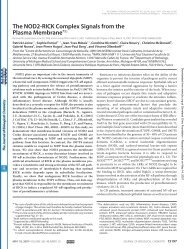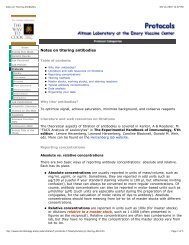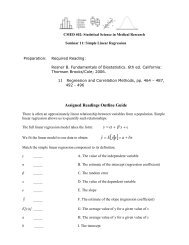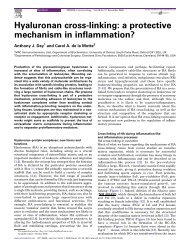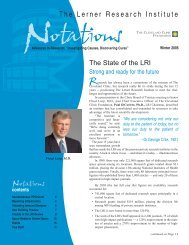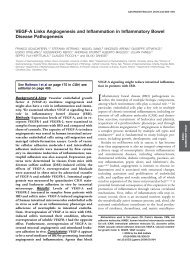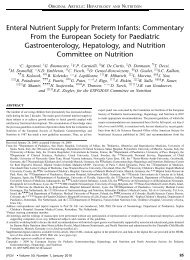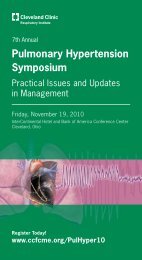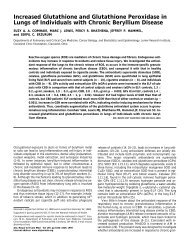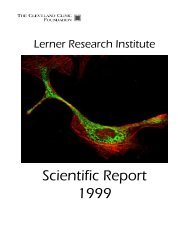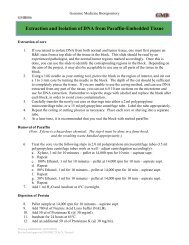Scientific Report 2003-2004 - Cleveland Clinic Lerner Research ...
Scientific Report 2003-2004 - Cleveland Clinic Lerner Research ...
Scientific Report 2003-2004 - Cleveland Clinic Lerner Research ...
- No tags were found...
You also want an ePaper? Increase the reach of your titles
YUMPU automatically turns print PDFs into web optimized ePapers that Google loves.
The Department of Cancer BiologyRole of DNA Polymerase β,a DNA Repair Gene, in OncogenesisThe focus of this laboratory is to elucidatewhether DNA polymerase β (polβ)contributes to carcinogenesis. DNA polβ isthe major contributor to gap-filling synthesis atAP sites of damaged DNA involved in the baseexcisionrepair pathway. The polβ gene, mappedon chromosome 8p12, is essential for embryonicviability and neurogenesisof mice. Additionalreports provideevidence that polβ playsa role in DNA replication,recombination,meiosis, drug-resistantphenotype and apoptosis.<strong>Report</strong>s from thislaboratory provided thefirst evidence for an 87-bp deletion encodingamino acid residues208-236 in the codingsequence of polβ inhuman breast carcinomasand fibroadenomasof breast, colorectal andlung carcinomas. A 36-kDa truncated polβprotein (polβ∆) is alsoexpressed in thesetumors.We have recently identified mutations in thegenomic sequence of polβ of primary ovariantumors. Furthermore, several truncated proteins areexpressed in cell lysates of ovarian tumors. Theseresults demonstrate that indeed mutations occur inthe polβ gene of human tumors. It is noteworthythat alterations in the coding sequence of the polβgene and expressions of polβ∆ protein have beenrevealed in low-malignant-potential borderlineovarian tumors.We hypothesize that cells expressing defectivepolβ would have an adverse biological effecton cells, leading to mutagenesis and carcinogenesis.To address this possibility, we established threestable cell lines: 16.3∆P expressing polβ∆ and 39-kDa wild-type (WT) polβ proteins, 19.4∆P expressingthe polβ∆ protein only, and 19.4WT expressingthe polβ WT protein. Possible hypersensitivityof cells expressing polβ∆ was examinedwhen DNA is damaged by MNU, a mutagen andcarcinogen. Hypersensitivity of cells was evaluatedby growth characteristics, susceptibility to morphologicaltransformation, anchorage independency andtumorigenic potential in the nude mouse. Transformationfrequency induced by MNU exhibited in16.3∆P cells was markedly higher than in 16.3 cellsexpressing the WT polβ∆ protein. Similarly, thetransformation frequency was enhanced in 19.4∆Pcells treated with MNU vs. 19.4WT cells exposedto MNU. Transformed cells formed colonies in softagar. These results clearly demonstrate that cellsSipra Banerjee, Ph.D.expressing polβ∆ are susceptible to transformation,especially to carcinogens.To test in vivo which cells are more susceptibleto carcinogenesis, those expressing polβ∆ or WTpolβ, we established 4 transgenic mouse lines thatexpress polβ∆ under the control of a WAP promoterin breast epithelial cells. To determine potentialdifferences in tumorigenicsusceptibility betweentransgenic and nontransgenicanimals, mice weretreated with MNU. Mammarytumors developedearlier in transgenic thanin nontransgenic mice.The polβ∆ expressedin tumor cellsinhibits the biochemicalfunctions of WT polβ,acting as a dominantnegativemutant. Moreover,we showed thatXRCCI, a repair protein, isdirectly involved in thedominant suppressiveactivity of polβ∆, leadingto the genomic instabilitycharacteristic of tumorcells. Notably, we found,by CD analysis, that polβprotein showed conformational instability. To findnovel proteins that might interact with polβ∆, wescreened a HeLa cDNA library using polβ∆ as baitin the yeast two-hybrid system. Two positiveclones with the EST sequence of a hypotheticalprotein, MGC5306, and a ubiquitously expressedtranscript were identified. By RT-PCR, we successfullyamplified the full coding sequence ofMGC5306 from the brain tumor cell line U373and breast cancer cell line MDA468. Characterizationof MGC5306 and study of the relationshipbetween its expression and tumorigenesis areunder way.THE S. BANERJEELABORATORYPROJECT SCIENTISTSNandan Bhattacharyya, Ph.D.Liming Wang, M.D., Ph.D.CLINICAL FELLOWSPedro Escobar, M.D.Effrosyni Mahali, M.D.POSTDOCTORAL FELLOWSSusmita Chakraborty, Ph.D.Neelam Yadav, Ph.D.COLLABORATORSJerome L. Belinson, M.D. 1Rathin Bose, Ph.D. 2Peter J. Mazzone, M.D. 3Joan B. Sweasy, Ph.D. 41Dept. of Gynecology andObstetrics, CCF2Dept. of Chemistry, Kent StateUniversity, Kent, OH3Dept. of Pulmonary andCritical Care Medicine, CCF4Dept. of Therapeutic Radiol.and Genetics, Yale Sch. ofMed., New Haven, CTBhattacharyya, N., and S. Banerjee (1997) A variant of DNA polymerase β acts as a dominantnegative mutant. Proc. Natl., Acad. Sci. USA 94:10324-10329.Chen, H.-C., Bhattacharyya, N., Wang, L., Recupero, A.J., Harter, M.L., and S. Banerjee(2000) Defective DNA repair genes in a primary culture of human renal cell carcinoma. J.Cancer Res. <strong>Clinic</strong>. Oncol. 126:185-190.Bhattacharyya, N., Banerjee, T., Patel, U., and S. Banerjee (2001) Impaired repair activity of atruncated DNA polymerase β protein. Life Sci. 69:271-280.Bhattacharyya, N., and S. Banerjee (2001) A novel role of XRCCI in the functions of a DNApolymerase β variant. Biochemistry 40: 9005-9013.Bhattacharyya, N., Chen, H,-C., Wang, L., and S. Banerjee (2002) Heterogeneity in expressionof DNA polymerase β and DNA repair activity in human tumor cell lines. Gene Expression10:115-123.Bhattacharyya, N., and S. Banerjee (<strong>2003</strong>) Analysis of alterations in a base-excision repair genein lung cancer. Methods Mol. Med. 74:413-438.49



